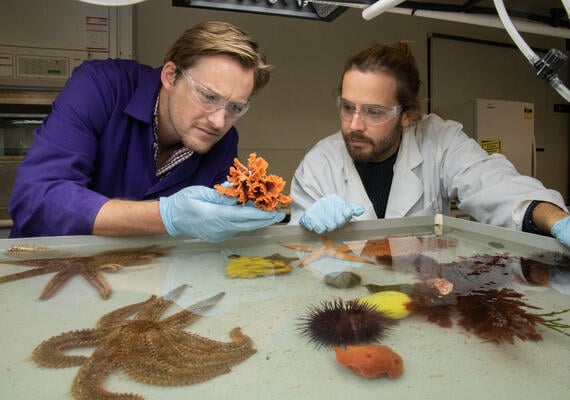Our team of multidisciplinary researchers conduct high-impact marine research through our four research areas. We rank well above world standard for research in fisheries, and environmental science and management.**
Professor Tim Dempster, Director of Deakin Marine, is a world authority on interactions between aquaculture and the environment, and production techniques and technologies. Among the top 2% of researchers globally, he leads the Sustainable Aquaculture Laboratory – Temperate and Tropical (SALTT).
Professor John Arnould leads the Ocean life and resources research area and examines the influence of environmental variability on top predators in south-eastern Australia. His research generates knowledge of climate change impacts on marine species, which is essential for conservation and economically important to fisheries, offshore energy and tourism.
Associate Professor Daniel Ierodiaconou leads the Coasts and people research area and heads the Deakin Marine Mapping Group. He uses multidisciplinary approaches to improve understanding of the coastal processes that inform marine ecosystem-based management, and co-developed the Eureka Prize-winning Victorian Coastal Monitoring Program.
Associate Professor David Francis leads the Aquaculture research area. His research investigates novel feed ingredients, aquafeed sustainability, nutritional requirements and lifecycle closure in marine species, and makes a vital contribution to the industry’s expansion and sustainability.
Professor Graeme Hays won a prestigious SCOPUS Research Award (ANZ) in 2022. His research employs satellite tracking to monitor patterns of habitat use by marine animals and has improved global sea turtle conservation.
Associate Professor Timothy Clark is an expert in aquatic animal ecophysiology and environmental change. He uses lab-based environmental manipulations and electronic tagging technologies to understand physiological and behavioural responses to environmental changes and anthropogenic perturbations.
Dr Prue Francis explores innovative methods to promote ocean literacy through research, education and engagement. Dr Francis also has an interest in the seaweed industry and restoration of seaweed ecosystems.



